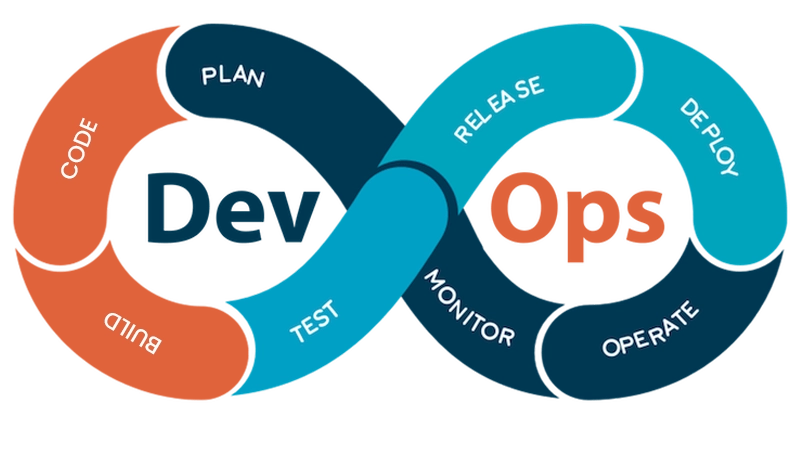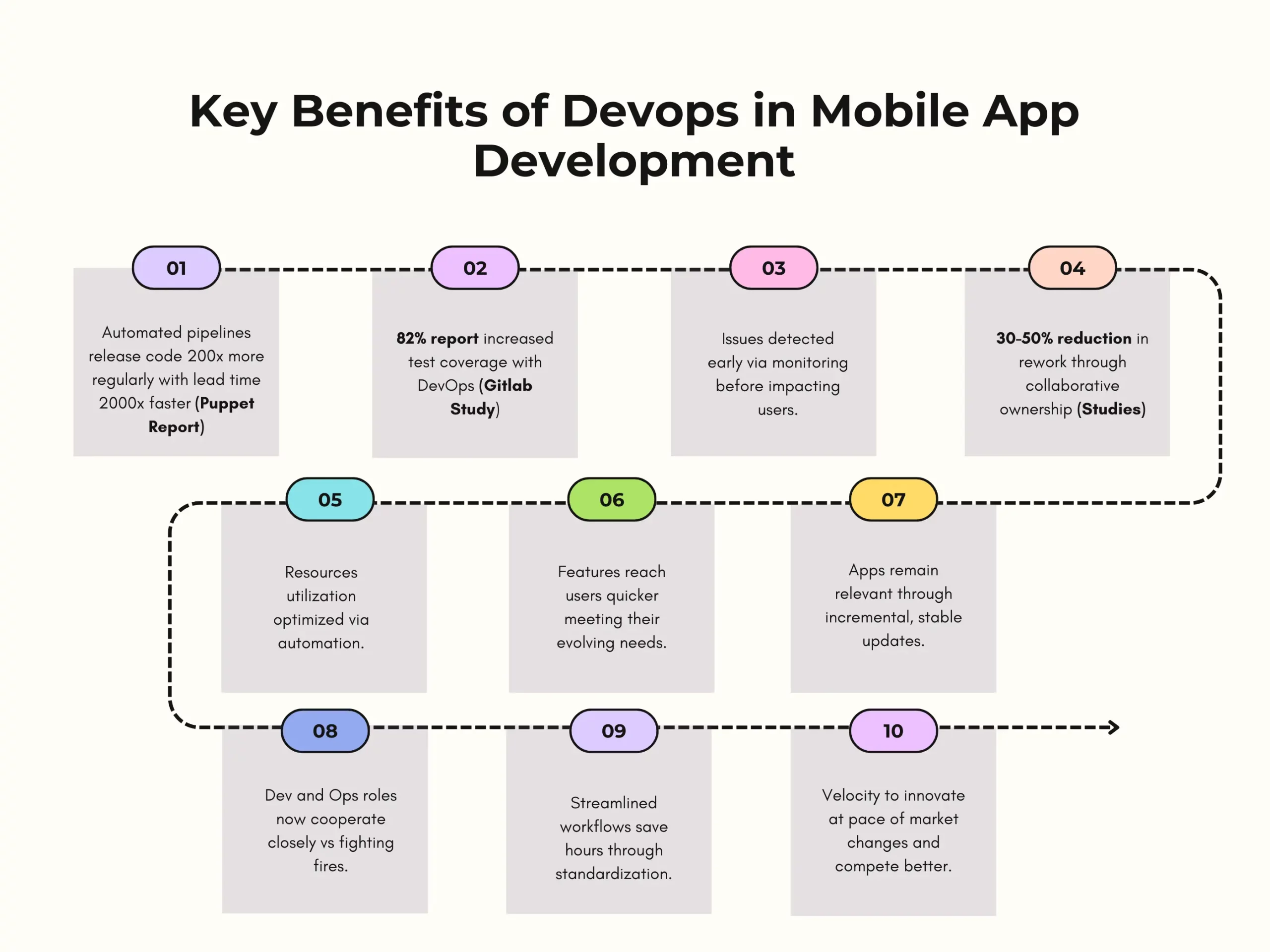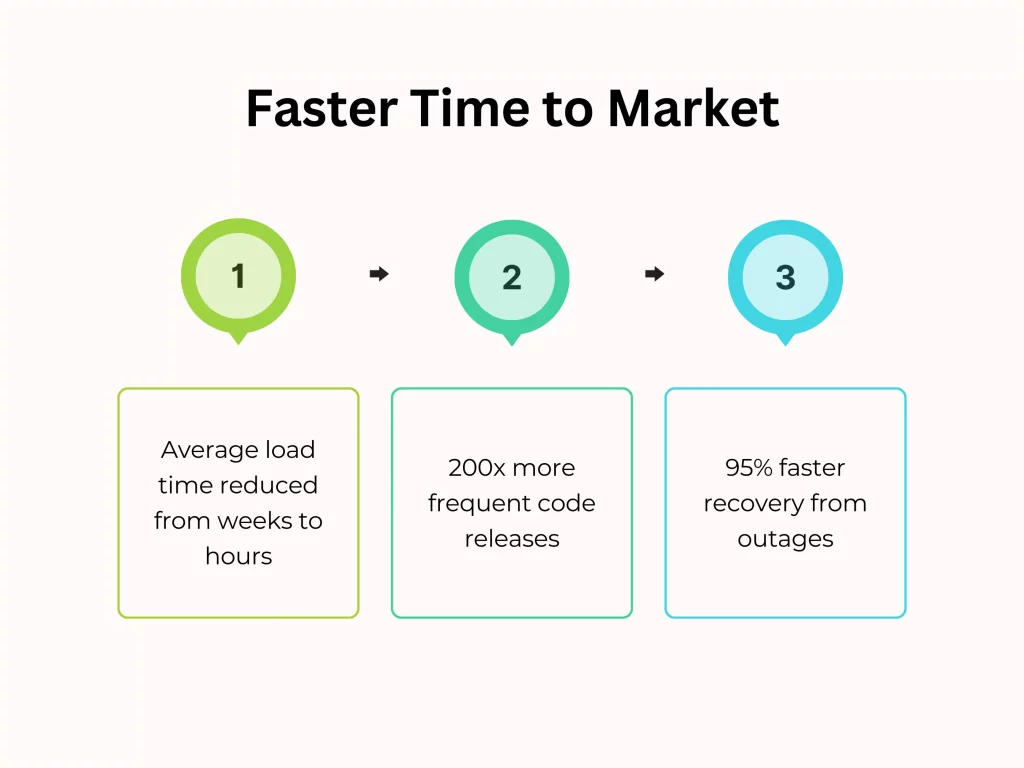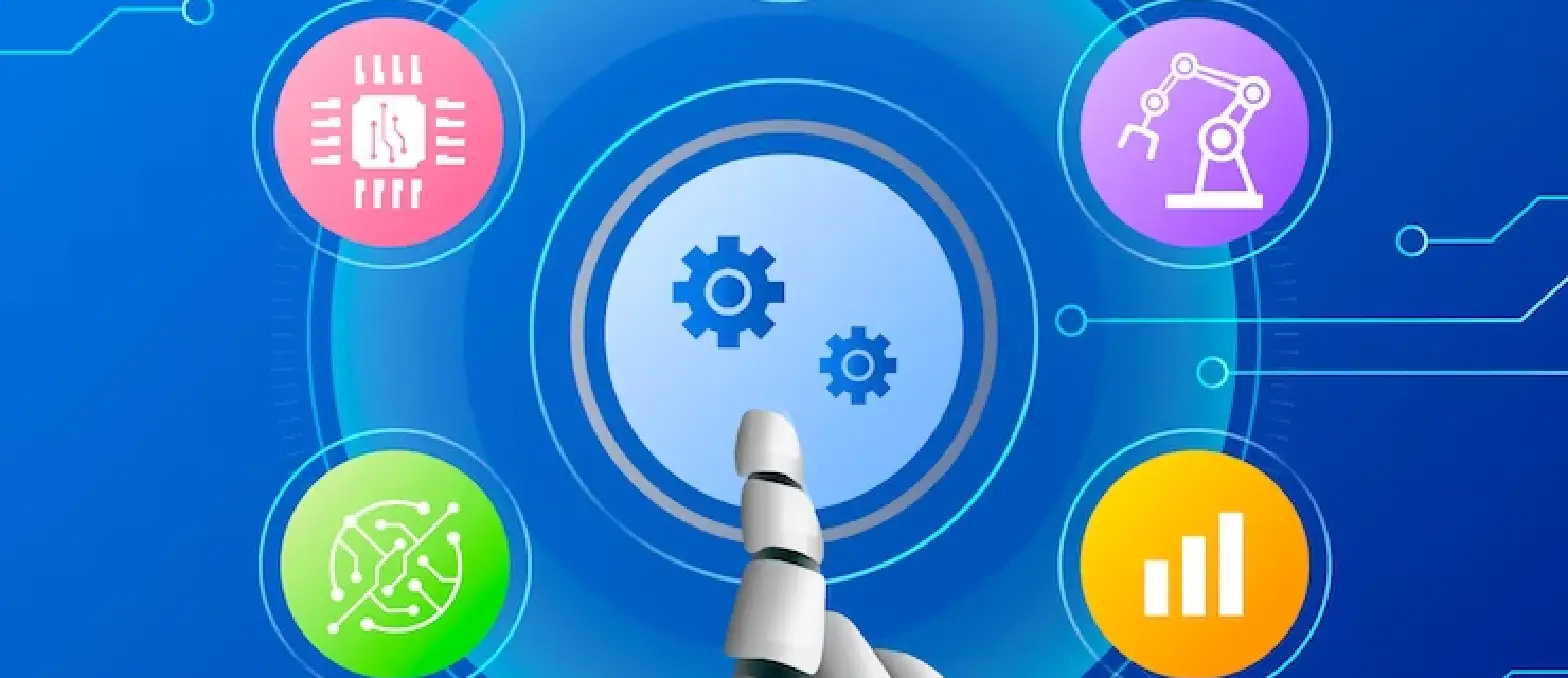Table of Contents
Imagine that you’re creating an application for mobile use. You need it to be innovative, user-friendly and most important, you’d like to get it out quickly, without sacrificing quality. This sounds like a big task isn’t it? But not if you’re using DevOps in mobile app development which is becoming more and more the basis of effective and efficient mobile application development.
DevOps is a method of development that focuses on continuous integration and delivery and enhancement, breaks up traditional silos and paves the way to faster and more efficient development processes. What exactly brings it on the scene? How does it impact the ways mobile applications are developed and distributed? If you’re interested in exploring the intriguing intersection between DevOps as well as mobile application development you’ve come to the right place. When you’re done with this dive, you’ll not only be able to comprehend the DevOps phenomenon, but also see how it’s changing how we develop, deploy, maintain, and manage mobile apps. So, get your seat ready for this thrilling adventure!
What is DevOps Anyway?
The term “DevOps” comes from an amalgamation of two words: Development and Operations. It’s an evolution in culture that encourages collaboration between traditionally separate IT operations and software development teams. This approach is holistic and enhances the lifecycle of software by ensuring continuous integration delivery, monitoring, and deployment which results in quicker and more reliable software deployment.
The DevOps app development company experts state that, In contrast to traditional IT operations that have operations and development are separated, leading to longer release times and a risk of conflicts, DevOps dissolves these barriers. Through a shared responsibility and effective feedback mechanism, issues are detected and addressed early, resulting in superior software quality and a harmonious work environment.

Moreover, when you put DevOps in the same room as the Agile app development process, their distinct roles become clear. While Agile is a method of making changes that are flexible during the development process in order to adapt to changing requirements of the customer, DevOps extends these principles to the operational side.
Role of DevOps in Mobile App Development
Here we discuss in detail how DevOps transforms mobile app development by bridging the development and operations divide, enabling continuous integration and delivery processes, and supporting frequent releases through the collaboration of cross-functional teams.
Bridging the Divide between Dev and Ops
One of the core principles of DevOps is that it breaks down silos between development and operations teams. In traditional app development approaches, there exists a significant communication gap between these teams.
Developers code features and bug fixes, while operations teams focus on maintaining infrastructure, deploying code changes into production environments, and ensuring app performance and uptime. Such disparate goals often lead to friction, delays in releasing features to users, and difficulty in tracking down issues post-deployment.
DevOps aims to integrate these previously segregated functions. By emphasizing collaboration and automation, DevOps helps developers and operations work together from planning to deployment. For example, developers get early visibility into operations key performance indicators like server loads and infrastructure bottlenecks. Likewise, operations teams understand development schedules and priorities.
The top mobile app development companies in USA state that such cross-functional collaboration ensures mobile apps are developed with an operations mindset from the beginning. It enables rapid and reliable releases by removing handoffs between siloed teams. Overall, DevOps helps bridge communication gaps that plague traditional development approaches. This speeds up the development cycle and significantly improves software quality.
Continuous Integration and Continuous Delivery
The top custom mobile app development company states that central to DevOps are the concepts of continuous integration (CI) and continuous delivery (CD). As developers commit code changes, CI runs automated builds and tests to catch issues early. It then shares the build artifacts with downstream teams seamlessly. CD takes this further by ensuring these validated changes can be released to production at any time.
When applied to mobile apps, CI/CD provides immense benefits:
- Faster Feedback Loops: With every code change triggering automated testing, developers get almost instant feedback on bugs or regressions. This accelerates the debugging and fixing process.
- Quality Focus: Rigorous testing at every change encourages developers to avoid risky changes and focus on quality. It prevents bugs from migrating across environments.
- Reliable Releases: Since every change is validated, releases become safer and more predictable. It gives confidence in updating apps frequently.
- Rapid Recovery: If issues are discovered post-deployment, previous known good builds can be re-deployed with confidence using CI/CD pipelines.
Overall, CI/CD transforms the way mobile apps are integrated, tested and released continuously in a sustainable way. It significantly boosts developer productivity and delivery confidence for customers.
Frequent Updates through Automation
In traditional approaches, updating existing mobile apps is a laborious and risky process. It involves extensive testing across multiple environments before each release. Such bureaucracy limits the frequency of app updates.
DevOps changes this culture through its principles of automation, monitoring and continuous delivery. By treating infrastructure as code and automating deployment pipelines, DevOps enables on-demand, low-risk releases. This encourages a culture of running experimentation and releasing updates more often than traditional quarterly or yearly cycles.
Frequent updates are crucial for mobile apps as user expectations evolve rapidly. It helps:
- Delight Users: By rolling out new features and fixes at a faster pace, users have a more delightful and up-to-date app experience.
- Stay Competitive: Mobile industries like social and shopping evolve daily. Frequent updates are critical to keep pace with competitors.
- Collect Feedback: Gradual, controlled changes provide an opportunity to discover issues early and incorporate feedback from real users.
- Test New Ideas: App development teams can safely experiment more ideas and hypotheses by progressively releasing iterations.
Overall, DevOps automation supports the release of higher quality updates more frequently through smaller, tested changes. This leads to happier customers and competitive differentiation.
DevOps tools for Mobile App Development
Adopting DevOps for mobile forces changes in how development operations are run:
- Infrastructure as Code: Infrastructure updates are now done declaratively through code versioned along with app code. This enables environment consistency, automation and scale.
- Monitoring & Metrics: Tools capture metrics across the full stack, from code to deployment to usage. These provide visibility for teams and enable data driven improvements.
- On-call Rotations: With automation reducing toil, SREs focus on rapid incident response, root cause analysis and preventive measures for future releases.
- Canary Releasing: Phased rollouts to a small subset of users before a full launch reduces risks from changes. Issues are caught before widespread impact.
- Continuous Security: Just like other quality aspects, security is incorporated through the development lifecycle with tools and automated testing.
- Config as Code: All configuration – from databases to APIs to services – are stored securely and version controlled for traceability.
Overall, DevOps development operations are more developer-centric, data-driven, automated and incident-focused compared to traditional release management. This ensures mobile apps are delivered faster and more robustly.
DevOps and Mobile App Development Company
For DevOps services to fully realize its impact on mobile apps, a phased approach is recommended:
- Initially focus on CI and basic deployment pipelines for rapid feedback.
- Gradually introduce monitoring, on-call rotations and infrastructure versioning.
- Over time implement canary releases, continuous security processes and more automation.
Leading enterprise app development companies around the world have successfully implemented DevOps practices to transform efficiency and quality. When selecting a vendor, check if they have:
- Expert DevOps consultants proficient in relevant tools and methodologies
- Mature processes around continuous integration, monitoring and on-call support
- A track record of reducing development cycles while improving app reliability and uptime
- Open and collaborative culture between development and operations teams
- Experience delivering apps across various mobile platforms and cloud infrastructure.
Engaging an experienced DevOps mobile app development company can help streamline processes from development to operations. It unleashes immense productivity benefits for timely roadmap delivery.
DevOps Mobile App Developers for Hire
For startups and SMBs reluctant to overhaul existing processes, they can hire DevOps app developers on a contractual basis to:
- Architect robust CI/CD pipelines for the apps using AWS CodePipeline, Jenkins etc.
- Implement infrastructure provisioning and versioning best practices on AWS, GCP or Kubernetes.
- Set up application monitoring for code quality, errors, metrics and logs.
- Advise on automation, security, configurations and release management best practices.
- Train and mentor existing teams on DevOps principles and collaboration workflows.
Such experts help kickstart the DevOps journey in a cost-effective manner. Small companies get the same quality and speed benefits of larger enterprises without overhauling existing teams. Over time, these practices can be internalized by core team members.
DevOps not only improves upon existing software development approaches but fundamentally transforms how mobile apps are engineered, tested, delivered and supported. When implemented comprehensively, it delivers immense business benefits through faster velocity, higher quality and happier customers.
Advantages of DevOps in Mobile App Development
The mobile application industry is rapidly evolving with users demanding frequent updates and new features at a faster pace. Traditional software development approaches struggle to maintain this velocity while ensuring quality and stability. This is where DevOps comes into play by transforming processes at the core.
Today, more than 82% report increased test coverage with DevOps. It emphasizes collaboration, automation, measurement, and sharing of knowledge between development and operations teams. When embraced in mobile app development, it provides immense benefits beyond just speed and efficiency. This article discusses in detail how DevOps impacts key aspects like continuous testing, monitoring, quality control, and more.

Continuous Testing and Monitoring
Traditional testing approaches are not suitable for the speed of mobile development. Teams conduct testing as a one-time phase towards the end of a sprint which leads to delays. DevOps enables continuous testing practices like test automation to validate code changes instantly upon commit. Tools like Selenium, Appium, and Espresso make automated UI, API, security, and accessibility testing of Android and iOS apps flawless.
Automated tests detecting bugs quickly help fix issues proactively before impacting users. Continual merging of code and testing also improve code quality gradually. Additionally, DevOps platforms provide integrated monitoring of apps in production environments. Any crashes, errors or anomalies can be identified in real-time through solutions like Sentry and Splunk. Insights from monitoring enable rapid fixing of issues.
Top custom app development services and iOS app development companies worldwide have seen first-hand benefits of continuous testing. A study by GitLab revealed that 82% of respondents experienced increased test quality and coverage with DevOps. Continuous testing has become a cornerstone of DevOps-led mobile development.
Creation of Advanced Apps
Traditional methodologies hamper incorporating iterative feedback from users and business stakeholders. DevOps tears down such barriers through its emphasis on collaboration, shared goals, and rapid feedback cycles.
Automated pipelines release code 200x more regularly with lead time 2000x faster. With DevOps practices like branching models and pull requests, ideas can be experimented safely without disrupting the main codebase. Feature flags and dark launches assist in evaluating changes before broad release. Feedback is incorporated almost instantly through automated testing and merging of valid fixes.
As per the top iOS app development companies, this empowers development teams to be responsive to user needs and deliver more innovative, thoughtful applications. As per a survey, enterprises embracing DevOps were able to develop more advanced apps. A collaborative, feedback-driven culture facilitates creation of sophisticated yet intuitive mobile experiences.
Faster Release Time
Time taken from writing code to deploying new features plays a big role in any app’s market competitiveness. DevOps’ continuous delivery practices standardize release procedures through declarative infrastructure definition, automated pipelines and approval workflows.
A study by Puppet revealed that top DevOps adopters release code 200 times more regularly than others with load time over 2000 times faster! Automated testing across environments gives confidence in releasing bug-free iterations at will. Most reputed mobile app development companies like Capital One and Target have witnessed substantial reduction in release cycles from weeks to hours with DevOps.
Frequent, incremental updates allow mobile app development teams to innovate at the pace of their customers while avoiding big “waterfall” style releases. It also improves visibility into the full development-to-production flow and ensures stability.

Improved Communication & Collaboration
Traditional silos result in misaligned goals, finger pointing and delays between development and operations teams. DevOps champions shared responsibility through visualization of workflows, transparency and collaboration.
Daily standup meetings, slack/team communication, joint planning and tracking enable fluid coordination. Release processes automate handoffs with auto-approval workflows. Developers proactively monitor and address post-deployment issues.
An Atlassian study reported 41% lower rework time and bugs through cross-functional awareness in DevOps. It streamlines mobile development by removing handoffs and bottlenecks between previously segregated roles.
Quality Control
Quality control plays a pivotal role in the mobile app industry where a single bug can severely impact user experience and revenue. DevOps integrates testing early in the development cycle with practices like test-driven development (TDD) and behavior-driven development (BDD).
Continuous integration runs automated tests on every code commit while coding is in progress. Code quality gates enforce standards before merging. Post deployment, monitoring tools detect anomalies and crashes proactively. Issues are fixed and retested instantly via automated pipelines.
Frequent releases consist of smaller changes which are less risky and easier to roll back in case of any regressions. Overall, DevOps improves quality by catching and fixing bugs continuously throughout the development lifecycle.
Automating the Build Process
The traditional “waterfall” approach of multiple sequential phases like coding, compiling, testing is replaced with automated pipelines. Infrastructure is provisioned through code check-ins which are built, tested and deployed continuously upon code commits through CI/CD.
This automation frees up human resources and removes delays as each phase is lightning fast. According to Google, top DevOps teams recover from downtime 96% faster than others due to tighter feedback controls. Automation also aids in reproducing exact environments, making the build process reliable and consistent across teams.
Reducing Process Delays
Bottlenecks, silos, manual hand-offs and wait times between different project phases often mar the development process. DevOps flattens organizational hierarchy and instills collaborative ownership of workflows.
Services are developed considering operational realities with monitoring, logging, and management in mind. Automated approval workflows eliminate wait times. Teams are empowered to take shared responsibility rather than work in isolation. As per research, shared responsibility reduces rework by 30-50%.
DevOps optimizes end-to-end load times and throughput by enabling continuous work in progress. The impact of such principles is multifold for mission-critical, safety-critical and mass usage mobile apps that require timely updates. Overall, DevOps streamlines the entire development lifecycle.
DevOps is revolutionizing mobile app development at world’s leading organisations by enhancing key facets of the process. Whether selecting top flutter app development companies in USA or hiring talented DevOps engineers, these principles deliver immense benefits beyond speed and efficiency alone. A DevOps-oriented strategy sets the stage for success in today’s fast-paced mobile industry.
Elevate Mobile App Development with Our Cutting-edge DevOps Solution!
Steps to Implement a DevOps Strategy
Making the transition to a DevOps method requires careful planning and the right execution. Here are the essential steps for ensuring a seamless and efficient implementation of an DevOps strategy:
Evaluate Your Needs
Begin with a thorough analysis of your business’s current procedures and workflows. Determine areas that can be improved by collaboration and automation as well as areas where there is resistance or a challenge. This will assist you to set the right goals in your DevOps transformation.
Prepare for the Shift
After that, prepare your teams to be ready for the change. This could include training on new methodologies and top DevOps tools and restructuring teams to encourage collaboration, and setting up new workflows that follow the DevOps principle for continuous integration, delivery and deployment.
Analyze the Present Scenario
Examine your current tools, infrastructure and processes. This will help you determine the areas that need to be improved, replaced or substituted to ensure a smooth shift to DevOps. It is also important to think about the capabilities and skills of your staff.
Make Way for Collaboration
The creation of a culture of collaboration is vital to the development of a DevOps in digital transformation strategy. This can mean breaking down the barriers between teams, encouraging open communication and an understanding of the collective accountability for the success of the product.
Plan Your Budget
Implementing the concept of observability in DevOps might require investing into new software, tools and infrastructure. Make sure you budget your money carefully and consider the long-term savings and the benefits of increased efficiency, speedier delivery times and better product quality.
Be aware that the change to DevOps isn’t a single-time event, it’s a process that is constantly improving. Be prepared to tweak your approach as you learn and expand as a company.
How to Execute Mobile DevOps
The mobile app industry has seen tremendous growth in recent years. However, releasing features at the pace required in this competitive landscape is no easy feat using traditional approaches. This is where DevOps in mobile app development comes into play by optimizing the development and deployment workflows.
Implementing DevOps in mobile app development calls for embracing a culture of integration, testing, collaboration and automation. When done right, it delivers immense benefits like faster innovation, better quality and reduced downtime. This article covers in detail the key pillars of Mobile DevOps including continuous integration, testing, monitoring, collaboration and quality practices.
Continuous Integration and Delivery
Continuous integration (CI) forms the core of DevOps integration with AI. It involves automating the build, testing and deployment process each time code changes are committed to the source repository. Popular CI tools like Jenkins, CircleCI and GitLab automate mundane tasks and catch errors early.
For mobile apps, CI configuration determines how code commits trigger automated builds, tests, packaging and other validation steps. Successful builds then get deployed to various environments like staging, pre production or production based on approval workflows. This enables fast, reliable delivery of incremental changes via automated deployment pipelines.
Leading android app development agencies and mobile application development consulting services focus heavily on CI best practices like – granular commits, pull requests, linting, static analysis etc. Small, frequent commits integrate changes seamlessly while pull requests facilitate code review. Overall, CI speeds up the feedback loop and raises quality standards.
Testing and Monitoring
DevOps in mobile app development extends testing to production environments for continuous evaluation. Test automation tools like Appium, Espresso and Calabash help validate UI, APIs and other functionality of Android and iOS apps reliably at every change.
Non-functional aspects also get tested via solutions such as Apache JMeter for load/performance and Appium Inspector for accessibility. Post-deployment, APM tools like New Relic and distributed tracing with Jaeger analyse real-time app behaviour and catch anomalies proactively.
Any performance degradation, crashes or errors trigger instant alerts. Analytics on usage patterns also surface under optimized code or areas requiring improvements. Overall, continuous testing and monitoring eliminate risks from recent changes and stabilize production.
Collaboration
True to DevOps spirit, Mobile DevOps breaks down silos between development, QA, operations and other teams. Modern tools like Slack, Microsoft Teams facilitate seamless coordination across locations.
Regular sync-up meetings ensure transparency and alignment of goals. Shared responsibility over systems through services enables collaborative ownership. DevOps consultants stress promoting psychologically safe environments where teams feel empowered to share ideas and solve problems together.
Quality and Delivery
Quality is an essential thread in using DevOps in mobile app development. Best practices like code reviews, feature toggles, canary releases gradually introduce changes while monitoring impact. Automating security, accessibility and other non-functional testing maintains standards.
Feature branches isolate risky work-in-progress from core code. Rigorous testing practices in DevOps in mobile app development validate all configurations and supported devices/OS versions. Monitoring post-release ensures no degradation in KPIs. DevOps experts automate remediation processes like telemetry-based roll-backs when needed.
Overall, these practices guarantee timely fixes for critical issues, with least disruption. Gradual progression of tested changes promotes quality and stability in parallel with speed of innovation expected in the mobile landscape.
Successful Mobile DevOps Implementation
Proper planning, tool selection, process definition and cultural shifts are important to leverage DevOps in mobile app development:
- Assess current practices and identify bottlenecks via value stream mapping with potential DevOps consultants.
- Select proper tools for CI/CD, testing, monitoring aligned with tech stacks and cloud providers after benchmarks.
- Design workflows, set standards and document SLA for various stages like integration, staging etc.
- Provide extensive training on new methodologies, practices and tools to teams.
- Start with automating major processes and scale incremental changes over time.
- Measure KPIs like MTTR, deployment frequency, lead time reduction along the DevOps journey.
- Institutionalise collaboration, transparency and automation in the culture via guilds, CoPs and incentives.
With the right approach, DevOps in mobile app development delivers immense benefits to businesses through speed, quality, visibility and efficient operations. It has become a vital strategy for competitive differentiation in this rapidly evolving industry.
Book 30 Minutes Free Consultations with A3Logics Experts to Start Your App Journey Today!
Final Thoughts
When we look back, we discern the vital importance DevOps can play in changing the development of mobile apps. From encouraging an environment of collaboration and sharing information to speeding up the release process while ensuring quality, the advantages of DevOps can transform the game. Its impact on the development of mobile apps is equally significant, allowing developers to create more efficient and robust applications.
In the near future, the use of DevOps in the development of mobile apps is expected to grow, with new trends such as AI and machine learning-powered DevOps also called AIOps and expected to dominate the scene. At A3Logics we welcome these advancements and stay at the leading edge of DevOps methods to create top-quality mobile apps that stand out on the market. If you’re thinking of integration of Cloud and DevOps or adopting DevOps to your mobile app development or assistance from a professional to improve your current processes We’re here to help and support you to be your reliable tech strategy. Contact us now
FAQs
Q1. What tools are commonly used for Mobile DevOps?
Ans. Popular tools include Jenkins, GitLab, AWS CodePipeline for CI/CD | Docker, Kubernetes for containers | prometheus, Datadog for monitoring | Jira, Github for project management.
Q2. Can DevOps benefit all types of mobile apps?
Ans. Yes, DevOps streams workflows for any iOS, Android, hybrid or PWA based apps across industries like healthcare, retail, gaming etc.
Q3. How much does DevOps implementation cost for mobile apps?
Ans. Costs vary based on scope, team size etc. of Android app development agency. But many practices like collaboration require only culture shifts without much investment.
Q4. What skills are required for mobile app DevOps roles?
Ans. DevOps engineers must have expertise in CI/CD pipelines, monitoring, security, containerization plus programming mobile platforms.
Q5. How do I choose the right DevOps consulting services partner?
Ans. You can select the right DevOps consulting services partner by checking experience, certifications, case studies in mobile domain, team skills and approach to cultural transformation and tool selection.






